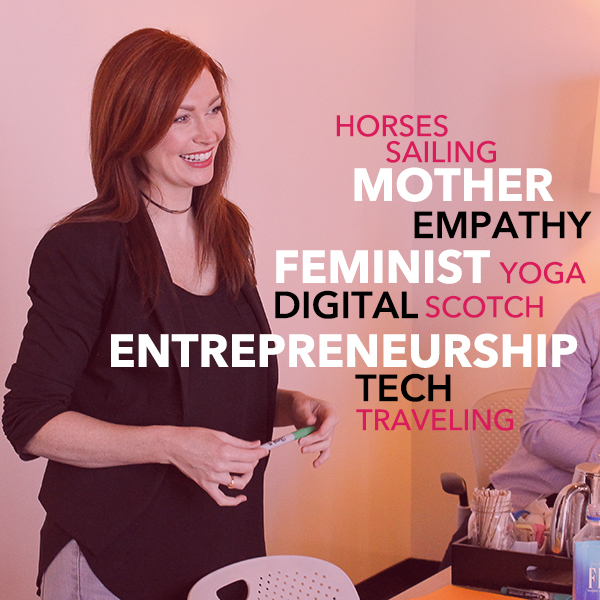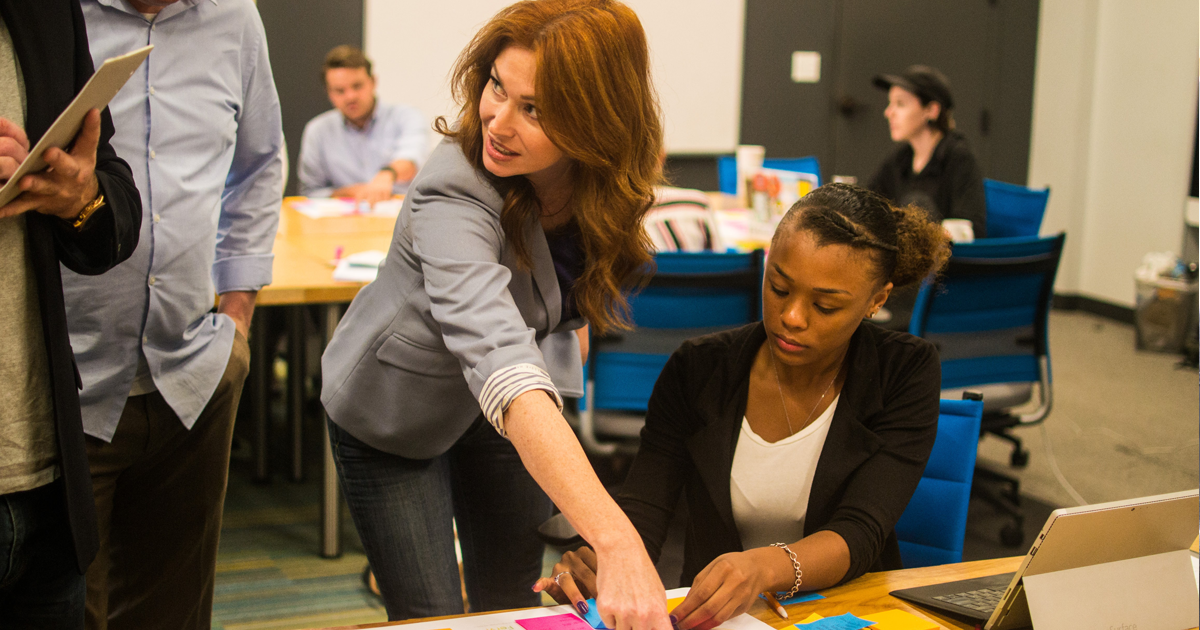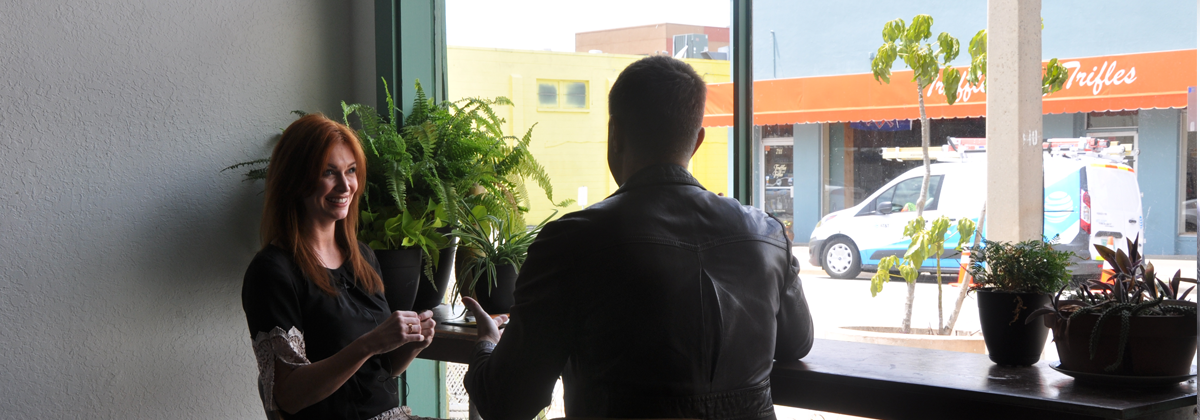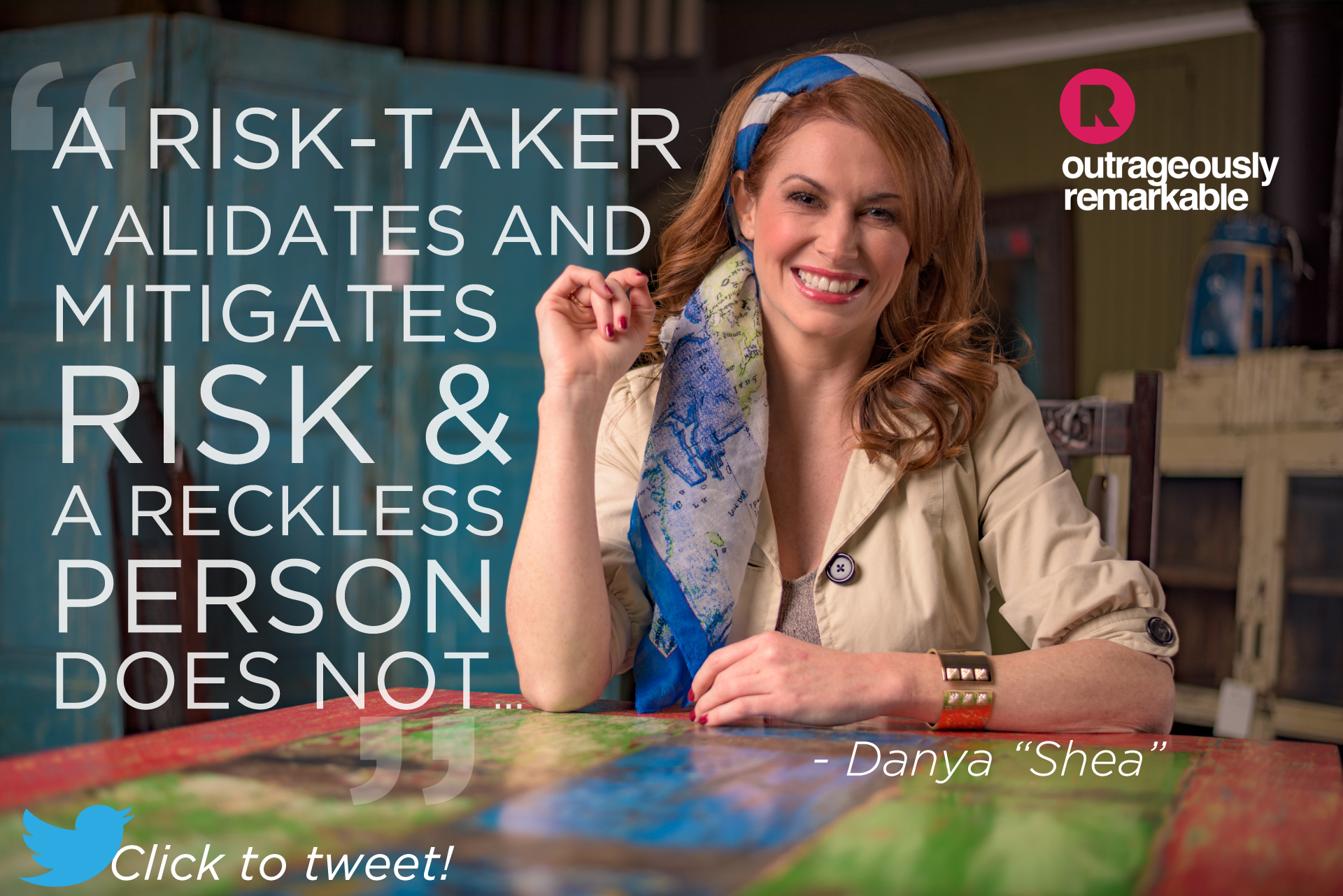Danya ‘Shea’
July 13, 2017
Is ‘Shea’ like an eccentric X-Men comic character that floats around like a ball of energy infusing superpowers to everyone she comes in contact with? Well actually ‘YES’ that’s pretty much right! We recently sat down to talk about innovation, entrepreneurship, feminism, kool-aid & a host of fun topics.
When I started to write this intro for Danya ‘Shea’, I realized that I might need to resort to bullet points in order to cover her multi-dimensional nature. Then, I had an epiphany: ‘Shea’s interview needs a word cloud graphic!’

It’s safe to say that she is quite dynamic; a womanpreneur that leads with her energy and enthusiasm.
In terrestrial terms, she is the Chief Activator at the Center for Entrepreneurial Leadership’s Blackstone Launchpad program, hosted by the UCF College of Business, where she lifts student ventures. She’s also the co-creator of the patent-pending FERVR framework, which is an empathy-based model for taking radical market share and outperforming the competition.
Let’s put the word clouds and analogies aside for a moment and find out more about Shea in her own words.
[Setting: We met at Ben Hoyer’s coffee shop, Downtown Credo, in College Park. This place gets quite busy during the afternoon so we grabbed a couple of bar stools at the front window. After receiving our coffee, we started recording … ]
Dean: Shea, everything you do is around frameworks, models and forward-thinking founders. What makes a founder forward-thinking?
Shea: Such a good question. So people who are ascribing to more of these business-design methodologies and are really paying attention to the new economy that we are in … whether you want to call it the sharing economy or the collaborative economy … and who are pretty excited about the digital age and the anthropological shifts that the digital age has brought and are doing business from a place of core values, whether they know to articulate that or not, that’s really how I identify a forward-thinking founder.
Dean: Since your focus is on innovation & entrepreneurship, what is the most consistent piece of advice that you give new entrepreneurs … and when I say new, I don’t necessarily mean young … just new in the entrepreneurship game.
Shea: Yeah, so those who are maybe in an encore career situation, maybe they’ve been in corporate America and now they’re ready to do it for themselves, or it could be students. Regardless, I think the first piece of advice for everyone is to be curious about failures. So rather than judge themselves or assign judgment to someone else for the failure, be curious about it because when we’re staying curious about everything in life, we have that growth mindset and we can turn failures into successes. We can kind of get those failures under our belt so that we can get on to the successes. Get through the bad ideas to get to the good ones, but we get stuck if we judge our failures.

Dean: What is a trait that you see that indicates a big red flag for new entrepreneurs? My first instinct [as an example] would be to say stubbornness. I can see how stubbornness may be a positive thing because you may be really stubborn about an idea that might not be successful at the beginning but is one that’s worth pursuing, but I also see stubbornness with regard to failures as not wanting to change even when you should. What trait would you pick up on as a red flag?
Shea: For me, in general, it’s fear, so someone who is fear-based. They can be afraid of insignificance, they can be afraid of incompetence, they can be afraid of any number of things … and we all have fears, but I need to see a sense of courageousness in order to face the fears and act anyway and if someone is paralyzed by fear or deterred by fear, that’s a big red flag for me. I can’t get someone over that hurdle in order to help them create progress in their venture.
Dean: It’s almost like they had enough courage to get in the pool, but they don’t want to get anything above their knees wet.
Shea: Yeah, that’s exactly it. They’re wading in too slowly and they’re going to miss the rate of change and the window of opportunity that’s coming.
Dean: I always wonder when I hear entrepreneurs talking about having a plan B in case the primary plan doesn’t work out. As you know, when I went into entrepreneurship, I didn’t have a plan B. Plan A was it. What do you think about that? When people are hedging? Do you think that shows a lack of commitment or do you think that’s smart?
…it’s really hard to create the right change in that initial project because the founder is already halfway checked out.
Shea: That’s a really good question. I think it depends on where they’re at in the journey. So if they’re just starting to consider entrepreneurship, or they’re just starting to consider taking a big risk with a new venture, having that day job and that steady reliable income actually helps them to make better early-stage decisions that are a little bit higher risk for higher reward, which are necessary. Sometimes, when we need a venture in the early stages to feed the family and keep a roof over our heads, we act a little more fear-based and we don’t take the right risks and make the right bold moves that we need to. Now, later on, when you’re dealing with like a Stage 2 company (when you’re talking over 5 million revenue up to 100 million annual revenue), a plan B is a really bad sign. So if I see a founder who already has shiny objects syndrome and he’s already got like six projects that he’s moving on towards … it’s really hard to create the right change in that initial project because the founder is already halfway checked out.
Dean: My final question about entrepreneurship is what is the biggest misnomer about entrepreneurship?
Shea: I think that where we have ambiguity and misunderstanding about entrepreneurship is when we talk about traditional small business models and traditional small business owners doing business in traditional methods … that is not entrepreneurship, in my opinion. Entrepreneurship deals with scalable, innovative, and disruptive. So you could have someone with a pizza shop on the corner of a town who is really pushing the envelope on locally-sourced ingredients or interesting talent models where talent comes in and they gain ownership in unique ways, or new technology for delivery methods … so they might have what looks like a traditional business, but they can still be a forward-thinking founder if they’re doing something that’s scalable, innovative, and disruptive and challenging the status quo.
Dean: So, what does that represent to you? The status quo.
I’m a disruptor by nature…
Shea: I’ve been waiting for this one [laughs]. So for me, the status quo is synonymous with ‘business as usual.’ I’m an innovator and I’m a disruptor by nature and yet, the status quo and ‘business as usual’ is not my enemy and I don’t think it’s the enemy to any innovator or disruptor who wants to be effective because it is the status quo and business as usual that creates the right stabilizing environment for sustainable change.
Dean: Interestingly, throughout these interviews and through some interactions on Twitter, I’ve been thinking about this more deeply lately. And I said something recently … the only people winging it are those who are totally clueless or those on the cutting edge. Everybody else is just looking to the status quo to understand what’s been done so that they can build from there.
Shea: I think you’re right about that.
Dean: Can you tell us what FERVR is all about?
Shea: Yeah! So FERVR is focused on providing forward-thinking founders with scalable systematic frameworks that help them take market share and build team cultures that attract and retain the best talent.
Dean: How long has it been around? What’s the background? How did it come to be?
Shea: My business partner, Bryan Noel is based in Atlanta and about four years ago, we were working consistently on projects … he does chief branding work and sales methodology work and I’ve done digital marketing and digital product development work … and we kept bringing each other in on big projects. And we found that we were helping clients kind of with the same set of tools and methods and kind of the same processes in all these very different environments … whether it was a government environment, or an education environment, or a small business environment, or even a tech company environment. We were getting really frustrated because we were being brought in downstream. You know like, “Oh, we need to update our storytelling, we need to put a marketing plan together, we need to measure our digital marketing, we need to develop an app…” And we were treated very downstream and we were just finding that the only way to create change was to move a little bit more upstream. So we said, okay, the consultant lifestyle is not for us. It’s fun sometimes, for a while, but that’s not our long term goal. We’re doing the same thing with these clients over and over and over and when we’re upstream with the leadership team, we effect change very easily and they get profound outcomes. We’re talking like 1000 times return beyond what we promised or guaranteed. So what if we turn this into a product? And so we just kind of lobotomized ourselves and we extracted from each other … what does the framework look like that we feel like consistently applies to a forward-thinking founder’s organization? That’s how FERVR was born and that was two years ago that we extracted that framework and then we spent a year testing the effectiveness of the framework and the applicability in different environments (business environments, social enterprise environments, non-profit, government, civic-building) and we were really pleased with the results. They were pretty profound.
Dean: What was your biggest insight about the framework after it was launched that you didn’t realize before launch?
Shea: Oh my gosh, that we were really affecting the identity expression of the forward-thinking founder’s own brand. So we don’t come in when companies say, “We need to rebrand, so we need FERVR,” and rebranding is not part of the framework. What we do at a very baseline is we come in, we help them get really clear on who their customer is, we help the entire team to empathetically identify with the customer, and then work backwards from that through their product development and their marketing. Once we’ve really started with the customer, and really knowing who the customer is, then we turn to them and say okay who are you in relation to this customer? How do you contextualize yourself as a founder, as a team, as a brand, as a company … how do you contextualize yourself to this customer now that we have such a clear idea of who that customer is? And that process, every single time, has created profound rebranding and re-expression of companies as an unexpected outcome and it’s beautiful.
Dean: I have a question that’s kind of like the movie Inception, but, has FERVR gone through the FERVR framework?
People will call you out on that so fast these days!
Shea: [laughing] We have, yes! So at the core of the framework, there’s a tool called the ‘ideal customer journey.’ It’s a one-page canvas and instead of the old-school funnel, it’s now kind of like this infinite loop of consideration and engagement that consumers have, and that is where we both start and finish at any framework implementation. So, we have a really fun ‘ideal customer journey’ and there are still a lot of gaps in ours because we’re still in beta.

Dean: Is it that map thing that Allison Walsh was carrying around?
Shea: Yeah, it is! So what’s great is that you use it as a vision tool, and a planning tool, and an aspirational tool. Bryan and I extract out of the founder’s hearts and minds … what do we really envision and understand the mindset of our customer to be at each stage of the journey and then what do we really want our brand promise and our brand experience to be for that forward-thinking founder at each stage of the journey? And then, how are we going to deliver on that brand promise? So a lot of it right now is aspirational for us so we have a lot of gaps to remedy, but that’s kind of part of the process. It’s like you never just build a website and then you’re done forever … it’s kind of like that with delivering an ideal customer journey. You’re never completely done.
Dean: But you’re drinking your own Kool-Aid, which is a good thing.
Shea: You have to, right? People will call you out on that so fast these days!
Dean: I like saying ‘drink your own Kool-Aid’ instead of ‘eat your own dog food’. The visual for me is just better … what motivates you or puts you on fire?
Shea: When I see that I have ignited a spark of ‘aha’ or a sense of meaning in another human, I’m like so richly satisfied. There’s a little bit of a struggle inside of me because I have a desire for scalability, to reach many … this subconscious drive to grow, grow and reach more and more, but when I’m very conscious and present, the very idea of, well, I’ve got these three people or these twelve people who are closest and dearest to my heart … if I continue to help them grow into their destinies and make that spark, that aha moment, come alive in their eyes, is that enough? Heck yeah, that’s enough. That’s everything. That’s my dilemma.
I cuss like a sailor and I drink like a sailor, but I’m actually an ordained minister.
Dean: Tell me something about you that is true that most people who know you wouldn’t believe.
Shea: What category? Like anything? [laughs] So, I cuss like a sailor and I drink like a sailor, but I’m actually an ordained minister.
Dean: Okay, so the first part was explaining why most people wouldn’t believe the last part.
Shea: They would definitely not be surprised by the cussing and drinking, but definitely about the ordained minister part.
Dean: Okay, so who is the most remarkable person you know and why?
Shea: I think in this phase of my life, it would have to be Leslie Hielema. Do you know her? [Dean: I don’t think I do.] The reason why she’s the most remarkable person I know is because she is the most courageous, daring, unafraid of resistance …
Dean: Well, I definitely want to meet her now!
Shea: She’s amazing, right?! So there’s all of that, but that could be reckless. That could be almost offensive, right? So it’s all tempered with wisdom and experience at market, and deep knowledge of decades working with people. She has this deep knowledge of how people work so she can see patterns much quicker than the average person can and she can anticipate the options ahead of those patterns, so she’s very bold and daring to get out ahead of those patterns, set the path that is going to be most beneficial for others. She’s very generous and compassionate and impact-oriented, so there’s that. She’s not dangerous with that power. I just admire the hell out of her. She’s just this enigma and I know her so, so well and I’ve gotten to spend so much time with her the past couple of years …
She was the first woman president in their 100 year history
Dean: How did you meet?
Shea: I was told that I should reach out to her when I wanted to bring a weeklong celebration of Global Entrepreneurship to Orlando. I met with different leaders in the city and I said, “Hey, I am new to town and when I was in Kansas City, we had this big, ongoing celebration of Global Entrepreneurship Week. From the few months I’ve been here, it kind of seems like we could use some activity (and this was 2013), does this idea resonate with you?” And everyone said, “you should talk to Leslie Hielema”; she was the former President of the Orlando Chamber of Commerce. She was the first woman president in their 100 year history. I got her contact information and reached out and I had learned that when you ask someone for their advice, be prepared to act on it, and then report back to them on how it worked out for you. So I’m careful about who I ask advice from now because I have to act on it. And so I did that with Leslie. I told her that I wanted to bring this whole week-long celebration across the whole city, 50 events, 20 venues, hundreds of people … it’s just me and this dumb idea. She gave me some feedback and I acted on it and I went back to her … and then she gave me some more feedback and I acted on it and went back to her. At the end, we launched the BIG Exchange and in some ways it was an awesome success and in some ways it was just a total failure and through that whole process, she had seen me and the way I work. When she moved over to Florida Institute of Technology as their Vice President of the Orlando Center, they wanted to bring a kind of female-focused accelerator to town and she thought of me.
Dean: Your focus in on entrepreneurs, but you’ve been exposed to so many people. I wanted to ask a question related to intrapreneurs. What is some advice you can give intrapreneurs on how they can stand out in their careers?
Shea: Absolutely. In my mind, I think entrepreneur and intrapreneur are very interchangeable because I think they both include the same mindset, the same core competencies, and use the same methodologies. I think the difference becomes in how the conversation is managed. So an entrepreneur has a lot of freedom. They can go and do whatever they want. They don’t really have to answer to anyone. An intrapreneur has many different departments and many different agendas that they need to take into consideration if they want to be effective in their internal innovations.
Dean: You mentioned reckless and risky before. How do you know the difference between risky and reckless?
Shea: I think that that’s a conversation that no one has ever brought up before and I encourage you to take that conversation further because I think it’s really important. Some people don’t realize that they are entrepreneurial because they’re risk-averse and they think entrepreneurs have to be reckless. I think that reckless is taking risks without validating and I think a true risk-taker is someone who assesses the variables and they do everything they can to reduce the unknowns and therefore mitigate the majority of the risk, and yet there is still a gap that they have to leap. So that’s what I think a risk-taker is. A risk-taker validates and mitigates risk and a reckless person does not validate and they don’t mitigate.
Dean: What is the most fun or interesting project that you’ve had the privilege of working on? Is there any project that comes to mind?
Shea: You know, recently we’re getting the chance to work with Purple Rock Scissors and having been in the Orlando community for a couple of years and coming from an agency background, Purple is just known for profoundly creative work and for being the number one talent attractor in the region. Producing projects for Facebook and always kind of on the cutting edge, so the fact that Purple looked at us and said, “Hey, can you come in and help us with some things,” was pretty cool.
Dean: OK, switching gears. I have to ask, you identify strongly with being a ‘feminist’ as you have declared on your public profiles online. What does that mean to you?
If you have a woman in your life that you care about, you can be a feminist.
Shea: It just means to me that I’m taking a specific stand for equal rights and equal access for women. It could also be called just being a conscientious human in my opinion (laughs). It’s kinda sad to me that we have to have a title for someone who advocates for women’s rights, but it’s maybe more sad to me that we have to advocate for equal rights at all.
Dean: Ahh, so a man can be a feminist?
Shea: (laughing) In the words of Chimamanda Ngozi Adichie “we should all be feminists” She’s just this really brilliant Nigerian author who I saw a TED talk from and she put it so simply. If you have a woman in your life that you care about, you can be a feminist.
Dean: And finally, what is your secret to being outrageously remarkable?
Shea: So, I think what makes me outrageously remarkable is that I am continuously on a journey to live a self-approved life and to create myself into someone that I love.
Dean: Well, everyone I met that knows you loves you so you’re doing a great job. So keep it up.
Shea: [laughs] Thanks!
Thank you, Shea. I’m ready to tackle the entrepreneurial grind with limitless energy after speaking with you!
__
Connect with Danya ‘Shea’ on Twitter & on FERVR’s website.
ALSO, don’t miss out! Sign up here to be an Outrageously Remarkable Insider & receive e-mails when new interviews are released.
…and thanks so much for clicking on the social share buttons at the top. Grateful for you joining us today!

